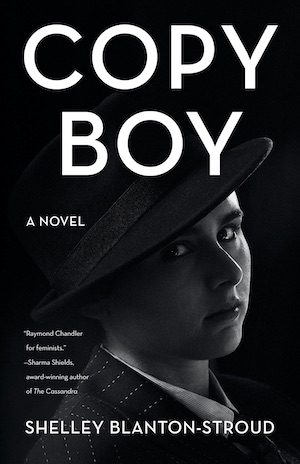Welcome to San Francisco in the 1930s. In the midst of the Great Depression it’s seen as a place of opportunity, and Jane Hopper is determined to grasp whatever chance comes her way and hold onto it, tight. Prepare to be drawn into the decidedly different Copy Boy, written by an author who has been described as ‘Raymond Chandler for feminists’.
There’s more than a touch of The Grapes of Wrath about Jane’s roots, and the opening chapters of this slice of noir are set firmly in the Dust Bowls of the Okie trail, where the Hopper family scratches a living picking cotton, living in a hovel built out of canvas and cardboard. At 17, Jane has had enough of living hand to mouth and she dreams of getting away. That’s all it is, a dream, until one day she takes destiny into her own hands… in dramatic fashion.
This girl is no shrinking violet, as evidenced in a dramatic few pages when she hands out her own unique form of justice to the man who stands in the way of her towering sense of ambition – her father. It ends with her leaving him for dead at the roadside and heading for San Fransisco, the land of opportunity, in a stolen car. Yes, Jane doesn’t do things by halves.
Or should that be Benny? Because after managing to inveigle her way into the home of an old friend, Sweetie, another Okie-made-good, Jane makes her next bold move. She wants a place at the local newspaper, and her only way to get a foot in the door is to disguise herself as a male and join the table of copy boys who do all the running in a busy newsroom.
Benny Hooper is a determined young cuss, and soon finds the makings of a scoop, sparked by a picture taken by an acclaimed female photographer. The subject is a downtrodden Dust Bowl family and Jane’s father is right there, front and centre, surrounded by a bunch of people Jane has never seen before. As she tries to find out more about the man she left for dead in the gutter, Jane is drawn into an investigation of the work of Grete Wright – and what she learns gives her pause. Is the photographer reporting on the plight of the downtrodden, or exploiting them?
Copy Boy is a book that oozes authenticity, from the lavishly detailed descriptions of the newspaper and its myriad departments, to the highs and lows of living in both the glitzy devil-may-care city and, in contrast, the shanty towns of Depression America – although in the latter it’s a case of existing rather than actually enjoying life. Benny/Jane hops between both worlds with ease and her wry observations add a frisson to the sharply depicted scenes. Shelley Blanton-Stroud displays a keen ear for dialogue and I enjoyed her attention to detail, right down to the outfits her characters wear.
For me, where Copy Boy falters a little is in Jane herself. Her upbringing has made her hard nosed and single-minded. These are both useful traits for a would-be newspaper reporter, but are not so sympathy-inducing in a book’s protagonist and as a consequence you may find her somewhat hard to like. Yes, she has redeeming qualities but they’re sometimes hard to spot.
There’s an unrelenting aura of despair about this book, which is appropriate for the era it depicts but can leave the reader feeling down too – my solution was to stand up and make a cuppa to break the spell, but other readers might relish and welcome the darkness that emanates from the pages.
Paul D Marks’ The Blues Don’t Care is another noirish novel set in Los Angeles in the middle of World War II. Also worth reading is Barry Forshaw’s Historical Noir.
She Writes Press
Print/Kindle
£0.79
CFL Rating: 3 Stars
